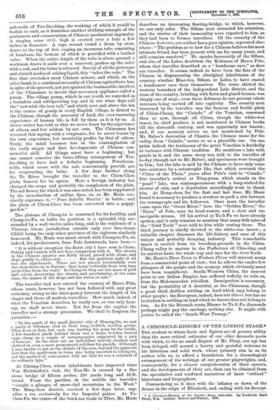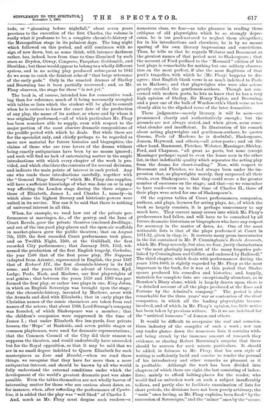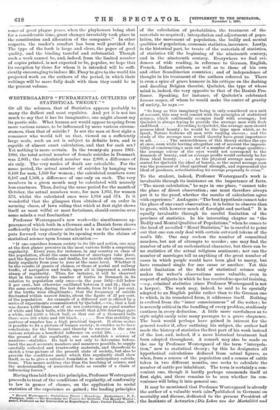A CHRONICLE-HISTORY OF THE LONDON STAGE.* THE student to whom
facts and figures are of greater utility than the mere critical estimates of our elder dramatic poets with which, to the no small disgust of Mr. Fleay, our age has been deluged, will accord a hearty and grateful welcome to his laborious and solid work, whose primary aim is, as its author tells us, to afford a foundation for a chronological arrangement of the writings of our greater playwrights, and, consequently, for a clearer comprehension of their careers, and the developments of their art, than can be obtained from the speculative and confused narratives of inert "critical" historians and biographers.
Commencing as it does with the infancy or dawn of the drama in the reign of Elizabeth, and ending with its decrepi- ChronieleZietory of the London Stage, 1589-1642. By Frederick Gard Fleay, MA. London: Reeves and Turner. 1890,
tnde, or " gloaming before nightfall," about seven years previous to the execution of the first Charles, the volume is really what it professes to be, a complete chronicle-history of the Metropolitan stage in its palmiest days. The long night which followed on this period, and still continues with no sign of new dawn, but, as some think, with intenser darkness rather, has, indeed, been from time to time illumined by such stars as Dryden, Otway, Congreve, Farquhar, Goldsmith, and Sheridan ; but these would appear to belong to a wholly different system, and in no acting play produced subsequent to 1642 do we seem to catch the faintest echo of "that large utterance of the early gods." Only in the unacted dramas of Shelley and Browning has it been partially recovered ; and, as Mr. Fleay observes, the stage for these " is not yet."
The book is, of course, intended less for consecutive read- ing than for reference, much of it being necessarily occupied with tables or lists which the student will be glad to consult when he is curious to know the exact date of the production of any play, the name of its author, or where and by whom it was originally performed,—all of which particulars Mr. Fleay has been somehow able to supply, even with respect to the major portion of the most obscure dramatic compositions of the prolific period with which he deals. But while these are for the specialist only, and chiefly perhaps to be regarded as mere raw material for future histories and biographies, the claims of those who are true lovers of the drama without being exactly antiquarians have been by no means ignored; and such will find no lack of entertaining matter in the ample introductions with which every chapter of the work is pro- vided, and which elucidate the contents of its several divisions, and indicate the main points of interest in each period. Any one who reads these introductions carefully, together with the " General Stage History" which Mr. Fleay also supplies, will have a sufficient knowledge of what was done on or in any way affecting the London stage during the three reigns— those of Elizabeth, James I., and Charles I., namely—in which alone the highest literary and histrionic powers were united in its service. Nor can it be said that there is nothing of universal interest in all this.
When, for example, we read how out of the private per- formances at marriages, &c., of the gentry, and the Inns of Court Revels, grew the private theatres (enclosed dwellings), and out of the inn-yard play-places and the open-air scaffolds in market-places grew the public theatres ; that on August 7th, 1559, the first recorded Court performance took place, and on Twelfth Night, 1560, at the Guildhall, the first recorded City performance ; that January 18th, 1562, wit- nessed the production of the first English tragedy, Gorboduc, the year 1566 that of the first prose play, The Supposes (adapted from Ariosto), represented in English, the year 1587 that of Richard III., the first chronicle-history in its full sense, and the years 1567-73 the advent of Greene, Kyd, Lodge, Peek, Nash, and Marlowe, our first playwrights of real genius ; that between the years 1558 and 1563 was per- formed the first play, or rather two plays in one, King Johan, in which an English Sovereign was brought upon the stage ; that the chronicle-history, invented by Marlowe, arose with the Armada and died with Elizabeth ; that in early plays the Christian names of the comic characters are taken from real names of the actors ; that about 1589, Lord Strange's company was founded, of which Shakespeare was a member ; that the children's companies were suppressed in the time of James I. ; that under Elizabeth five inn-yards, four private houses, the Hope ' at Bankside, and seven public stages or common playhouses, were used for dramatic representations ; that the Common Council of the City did their utmost to suppress the theatres, and would undoubtedly have succeeded but for the Royal opposition, so that it may be said that we are in no small degree indebted to Queen Elizabeth for such masterpieces as Lear and Hamlet,—when we read these things, we recognise that they have far more than a mere antiquarian interest, and should be known by all who would fully understand the external conditions under which the development of the world's greatest dramatic poet was alone possible. Even the tables themselves are not wholly barren of interesting matter for those who are curious about dates, as, for instance, when, after regording the performance of Cynybe. line, it is added that the play was "well liked" of Charles I.
And, much as Mr. Fleay must despise such readers—a numerous class, we fear—as take pleasure in reading those critiques of old playwrights which he so strongly depre- cates, he is too good-natured to neglect them altogether; for in his introductions and elsewhere, he is by no means sparing of his own literary impressions and convictions. Thus, he tells us that he regards Webster and Beaumont as the greatest names of that period next to Shakespeare ; that the account of Ford prefixed to the " Mermaid " edition of his best plays is remarkable for nothing but one solitary observa- tion on the most perfect, if also the most flagitious of that poet's tragedies, with which he (Mr. Fleay) happens to dis- agree; that English blank verse is as much indebted to Peele as to Marlowe ; and that playwrights who were also actors greatly excelled the gentleman-authors. Though not con- cerned with modern poets, he lets ns know that he has a very high opinion of Shelley, Sir Henry Taylor, and Browning, and a poor one of the bulk of Wordsworth's blank verse as too closely akin to the slipshod verse of the later dramatists.
These judgments—merely literary, it will be seen—are pronounced clearly and authoritatively enough ; but the grounds are not always stated, and when given, seem some- what slender and insufficient. In illustration of his remark about acting playwrights and gentleman-authors, be quotes Greene, Peele (of Marlowe he is doubtful), Shakespeare, Jonson, Haywood, and others,—all actor-poets ; and on the other hand, Beaumont, Fletcher, Webster, Massinger, Shirley, Ford, and Chapman, "all great as poets, but none (except Massinger perhaps) equal to even the lesser men in the other list, in that indefinable quality which separates the acting play from the drama for closet-reading." Now, with respect to Beaumont and Fletcher, we had always been under the im- pression that, as playwrights merely, they surpassed all their rivals, even Shakespeare ; that they could score a far greater number of successes on the stage; and that—so we remember to have read—even up to the time of Charles II., three of their plays were acted for one of Shakespeare's.
Of the copious tables of Court performances, companies, authors, and plays, licences for acting plays, &c., of which the book so largely consists, it is perhaps unnecessary to say much here. They correct many errors into which Mr. Fleay's predecessors had fallen, and will have to be consulted by all future dramatic historians or biographers who have any respect for accuracy in the matter of dates, &c. One of the most noticeable lists is that of the plays performed at Court in 1611-12, given in chap. iv. It corrects many gross inaccuracies in the list contained in Mr P Cunningham's Revels Accounts, which Mr. Fleay severely, but also, we fear, justly characterises as "the most glaringly impudent of the many forgeries pub- lished by Cunningham and Collier, and endorsed by Halliwell." The third chapter, which deals with performances during the years 1594-1603, is rightly regarded by Mr. Fleay as the most important in the book, for it was at this period that Shake- speare produced his comedies and histories ; and, happily, materials for complete lists are exceptionally abundant, as in Henslow's Diary alone, which is largely drawn upon, there is " a detailed account of all the plays produced at the Rose and Fortune by the Admiral's company." The period is also remarkable for the three years' war or contention of the rival companies, in which all the leading playwrights became involved, and of which, in Mr. Fleay's opinion, too little notice has been taken by previous writers. To it we arc indebted for the " satirical humours " of Jonson and others.
It would be difficult to overpraise the zeal and conscien- tious industry of the compiler of such a work ; nor can any reader glance down the numerous lists it contains with- out being struck by the immense amount of research they evidence, or sharing Robert Browning's surprise that there should be sources for such minute particulars. It. should be added, in fairness to Mr. Fleay, that his own style of writing is sufficiently lucid and concise to render the perusal of his introductory and other remarks as pleasant as it is profitable. Although the work has been divided into chapters (of which there are eight, the last consisting of index- lists), mainly to afford halting-places for the reader, who would find an unbroken work on such a subject insufferably tedious, and partly also to facilitate examination of lists for short periods, the divisions have not been purely arbitrary, the " main " ones having, as Mr. Fleay explains, been fixed " by the succession of Sovereigns," and the " minor " ones by the "occur-
rence of great plague years, when the playhouses being shut for a considerable time, great changes invariably took place in the constitution and allocation of the companies." In other respects, the reader's comfort has been well provided for. The type of the book is large and clear, the paper of good quality, and the binding tasteful and substantial. Though such a work cannot be, and, indeed, from the limited number of copies printed, is not expected to be, popular, we hope that its reception by those for whom it is intended will be suffi- ciently encouraging to induce Mr. Fleay to give to the world his projected work on the authors of the period, in which their writings will be more fully dealt with than they could be in the present volume.




















































 Previous page
Previous page